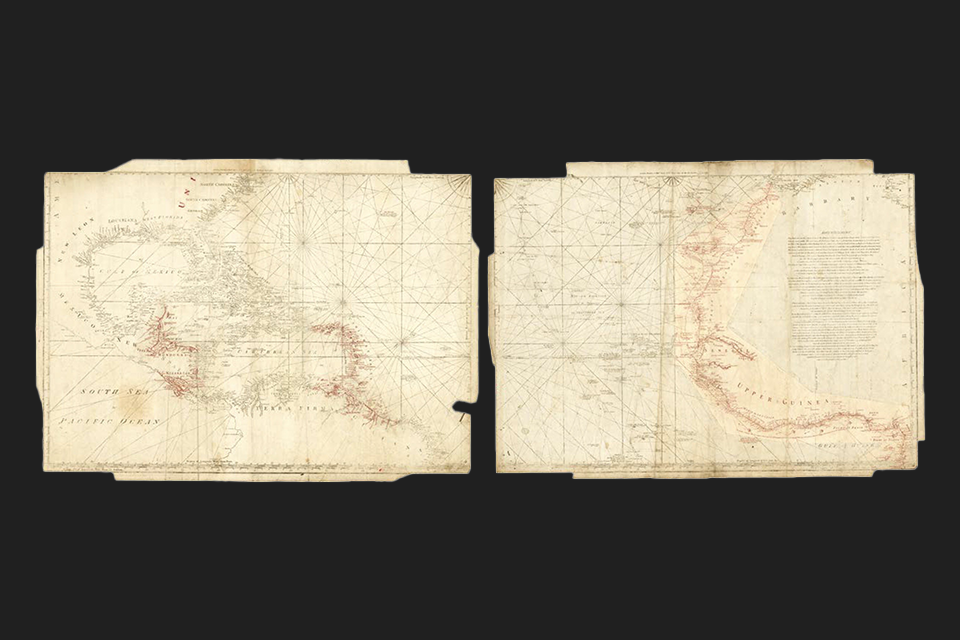- Export bar is to allow time for a UK museum or institution to acquire the collection
- Records of Britain’s most significant commercial chart makers from the late 18th and 19th centuries has been valued at £6 million
An export bar has been placed on an extraordinary collection documenting Britain’s rise as the world’s leading maritime power to allow time for a UK gallery or institution to acquire it.
The historic archive of Imray, Laurie, Norie and Wilson – comprising the records of Britain’s most significant commercial chart makers from the late 18th and 19th centuries – has been valued at £6 million and represents an important source of knowledge relating to British commercial chartmaking at its prime.
The collection spans over 200 working charts, rare maritime atlases in their original ‘blueback’ bindings, and unique artefacts including a copper plate for an original chart by explorer James Cook and a chair believed to have been used by Lord Nelson.
It is the largest surviving archive documenting the work of commercial chart-making firms from this era. These firms were essential to Britain’s expanding maritime power during the period when the nation rose from being one of several competing European powers to become the dominant global force of the 19th and early 20th centuries.
Arts Minister, Sir Chris Bryant said
This extraordinary collection helps us better understand Britain’s transformation into a global maritime power.
I hope that a museum or institution can come forward to help secure this collection for future generations so that researchers and the public can learn about this crucial chapter in British history.
Caroline Shenton, Committee member
Britain’s position as a global superpower in the eighteenth and nineteenth centuries was in large part due to its dominance at sea. For this, the Royal Navy and merchant shipping relied on accurate maritime charts of the world’s oceans and far-flung coastlines. This incredible archive, the surviving records of the premier chart-making firm and its predecessors of Imray, Laurie, Norie, and Wilson, sheds light on one of the principal means by which Britannia ruled the waves for several centuries. It is my fervent hope that a suitable home in the UK will be found for this outstanding, beautiful and fascinating collection.
The Minister’s decision follows the advice of the Reviewing Committee on the Export of Works of Art and Objects of Cultural Interest (RCEWA).
The Committee made its recommendation on the basis that the collection met the first, second, and third Waverley criteria for its outstanding connection with our history and national life, its outstanding aesthetic importance, and its outstanding significance to the study of British commercial chart making, the British Empire and naval history. It was also of outstanding significance to the study of the businesses involved in the commercial publication of maritime charts in the UK from the late 18th century to the early 1900s, shipping routes, and climate change.
The decision on the export licence application for the collection will be deferred for a period ending on 10 November 2025 inclusive. At the end of the first deferral period owners will have a consideration period of 15 Business Days to consider any offer(s) to purchase the collection at the recommended price of £6,000,000 (plus VAT which can be reclaimed by an eligible institution). The second deferral period will commence following the signing of an Option Agreement and will last for six months.
ENDS
Notes to editors
- Organisations or individuals interested in purchasing the panel should contact the RCEWA on 02072680534 or rcewa@artscouncil.org.uk.
- Details of the item are as follows The manuscript and printed archive of the maritime publisher Imray, Laurie, Norie and Wilson. Charting the firm’s birth, rise, and heyday, from the 18th to the beginning of the 20th century.
- Provenance Imray, Laurie, Norie and Wilson Ltd
- The Reviewing Committee on the Export of Works of Art and Objects of Cultural Interest is an independent body, serviced by Arts Council England (ACE), which advises the Secretary of State for Culture, Media and Sport on whether a cultural object, intended for export, is of national importance under specified criteria.

